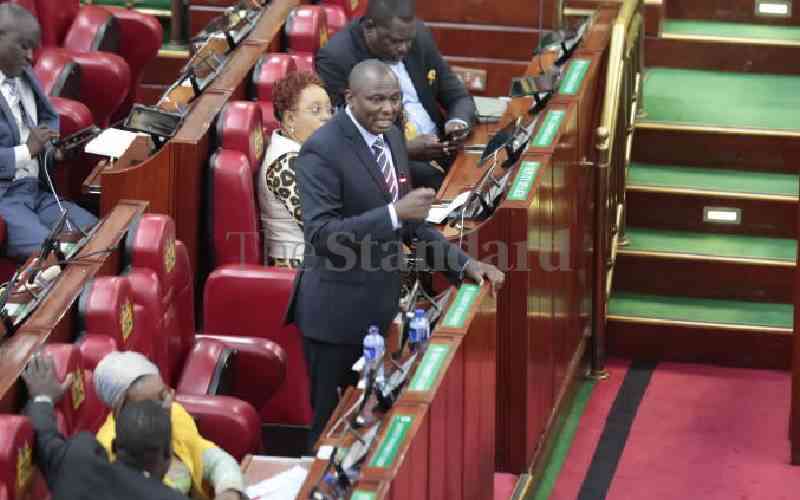By Harold Ayodo
Several months ago the Business Premises Rent Tribunal sitting in Kisii ordered a landlord not to collect rent for seven months. The landlord had barred his tenant from accessing the premises after a rent conflict.
The landlord was further ordered not to harass the tenant by closing the premises.
This is just one of the cases where landlords have been denied powers to arbitrarily control their premises.
In the same way, the Rent Restriction Tribunal has a mandate to hear and determine disputes filed by both tenants and landlords of residential premises. Disputes between landlords and tenants over failure to honour responsibilities are common.
For instance, most tenants in Nairobi’s Eastlands fall prey to landlords who serve them eviction notices when asked to repair dilapidated premises. Some tenants put up in deplorable conditions — overflowing sewers and leaking roofs — and promptly pay rent without question.
There are cases where verbal exchanges have degenerated into brawls between tenants and landlords in residential and commercial premises. Some tenants in middle-class and up-market areas also have contentions with property owners who fail to honour tenancy agreements and vice versa.
Many tenants are at the mercy of the landlords because they overlooked the importance of signing tenancy or lease agreements before they moved in.
Such landlords have a leeway to increase rent with impunity and even threaten the tenant with eviction without notice. Other landlords resort to bullying tactics like disconnecting electricity and water, and involving auctioneers.
Take the case of Nelly Wambua, who says she moved out of her previous house in Nairobi West last month after her landlady made her life miserable.
"My March salary had delayed for a week and the landlady disconnected both electricity and water," Wambua says.
Wambua had explained her predicament to the landlady and told her that salaries would delay as the company was cost-cutting and retrenching redundant staff.
"I used to pay Sh15,000 per month but she insisted she wanted rent promptly and increased it to Sh20,000," Wambua says.
Unable to do anything, she moved out and learnt that her successor pays Sh22,000 per month for the same one-bed roomed house.
On the other hand, cunning tenants also rent houses and secretly sub-let rooms without the knowledge of the owner, which is illegal.
Stay informed. Subscribe to our newsletter
However, lawyers say the tenancy disputes can be resolved amicably without verbal abuses or physical assault. Lawyer Juliet Busienei says disagreements between tenants and landlords can be resolved before rent tribunals.
 |
Houses in Nairobi. Disputes between tenants and landlords can be resolved by legal mechanisms. |
The Rent Restriction Act and the Landlord and Tenant Act provides for the process landlords should follow to recover unpaid rent.
"Landlords whose houses go for less than Sh2,500 per month should move to the Rent Restriction Tribunals to seek permission to recover arrears," Busienei says.
Rent Tribunals dealing with residential premises are under the Ministry of Housing with ten fully-fledged stations countrywide. They are located in Nairobi, Mombasa, Kisumu, Nakuru, Nyeri, Kakamega, Eldoret, Embu, Garissa and Lamu and are presided over by advocates of the High Court.
The Distress for Rent Act (DRA) explains the procedures landlords should follow to recover rent arrears of premises that costs over Sh2,500 per month. Those with rental disputes above this amount can go to the High Court.
"The landlord has authority to instruct his/her advocate to engage a licensed auctioneer to levy distress for rent arrears," Busienei says.
She says landlords of commercial premises (controlled tenancies) should seek permission from the Business Premises Rent Tribunal before levying distress.
The Business Premises Rent Tribunal was established by an Act of Parliament in 1965 and is presided over by an Advocate of the High Court.
The tribunal sits at Bima House along Harambee Avenue, Nairobi and is under the Ministry of Trade and Industry.
"Landlords of business premises who eject defaulting tenants for recovery or rent without orders from the Business Tribunal breach the law," Busienei says.
As such, tenants can seek injunctions restraining landlords from levying distress, attaching and selling their property.
Tenants can also enter into agreements with landlords on the mode of payment of the arrears and maintain the premises.
The Landlord and Tenants Act imposes restrictions on a controlled tenancy if he/she increases the rent or terminates the tenancy at will. The landlord is required to issue a tenant with a notice and is essentially prevented from evicting him/her without referring the dispute to the Tribunal.
Tenants have a right to oppose evictions or termination of tenancy by opposing the application of the landlord before the Tribunal.
Tenancy obligations
Lawyer Lucas Kang’oli says landlords and tenants are required to have their agreement in writing for purposes of clarity.
"The Registered Lands Act (RLA) and the Indian Transfer of Property Act (ITPA) are among the legislations that spells obligations of tenancy," Kang’oli says.
Kenyan Macharia a resident of Lang’ata Estate in Nairobi says owners of the modern flats and apartments in Lang’ata are vigilant in enforcing lease agreements.
"My agreement with my landlord is to deposit the Sh20,000 rent at a local bank at the end of every month as per the one year lease (tenancy) agreement," Macharia says.
He then gives the deposit slip to the caretaker of the flat for accounting purposes.
"Distress (seizing of movable properties) for rent is the way to go for tenants who breach tenancy agreements…there are those who have been evicted," Macharia says.
Landlords should ensure tenants enjoy their rights and protect them against interference by his agents or be guilty of breach of the covenant. It is illegal for landlords to demand to view a rented property before issuing reasonable notice to the tenant and at a convenient time — such owners are liable for trespass.
Residential houses and commercial premises must be fit for the purposes, which they are rented and the owner must disclose defects the tenant cannot discover ordinarily.
The RLA provides for the suspension of rent — partially or in full — if the leased (rented) property is destroyed by fire or unrest.
"Tenants can lawfully stop their monthly payments if the rented property is inhabitable six months after destruction by fire after issuing a one month notice," Kang’oli says.
The ITPA — which is applicable in Kenya — cancels the tenancy agreement if the rented property is unfit for the purposes they were rented.
"Cancellation of the agreement, however, does not apply when the destruction is either caused or follows the negligence of the tenant," Kang’oli says.
Most property laws bestow on the landlord the responsibilities of maintenance of roofs, walls, drains, common passageways and installations.
"Tenants should pay their rent as agreed before they moved into the property unless the house or premise is destroyed and inhabitable," Kang’oli says.
Tenants must also maintain the rented property in the condition they found them especially when the agreement has no provisions for repairs.
The law forbids occupants from transferring, charging or sub-letting the rented property without written permission of the landlord.
Legal proceedings
The landlord should not break into the house unless the tenant has removed some belonging, which can be searched within 30 days before the forced entry.
"Illegal distress by the owner amounts to trespass and could give rise to damages for double the value of the goods seized," Kang’oli says.
The landlord can — besides levying distress — commence an action for money towards recovery of the rent due. Legal action to recover defaulted payments, should commence within six months from the date the rent was last acknowledged to be due.
There are also tenants who stress landlords despite the landlord fulfilling their part as required in tenancy agreements.
For instance, Patricia Wanjiku who owns a commercial building in town has evicted three tenants over the past two years over unpaid rent. Wanjiku sought legal proceedings before she eventually evicted her tenants and says the process is too costly.
"Most landlords resort to auctioneers because the legal process drags as the tenant continues to enjoy facilities," Wanjiku says.
 The Standard Group Plc is a
multi-media organization with investments in media platforms spanning newspaper
print operations, television, radio broadcasting, digital and online services. The
Standard Group is recognized as a leading multi-media house in Kenya with a key
influence in matters of national and international interest.
The Standard Group Plc is a
multi-media organization with investments in media platforms spanning newspaper
print operations, television, radio broadcasting, digital and online services. The
Standard Group is recognized as a leading multi-media house in Kenya with a key
influence in matters of national and international interest.
 The Standard Group Plc is a
multi-media organization with investments in media platforms spanning newspaper
print operations, television, radio broadcasting, digital and online services. The
Standard Group is recognized as a leading multi-media house in Kenya with a key
influence in matters of national and international interest.
The Standard Group Plc is a
multi-media organization with investments in media platforms spanning newspaper
print operations, television, radio broadcasting, digital and online services. The
Standard Group is recognized as a leading multi-media house in Kenya with a key
influence in matters of national and international interest.









